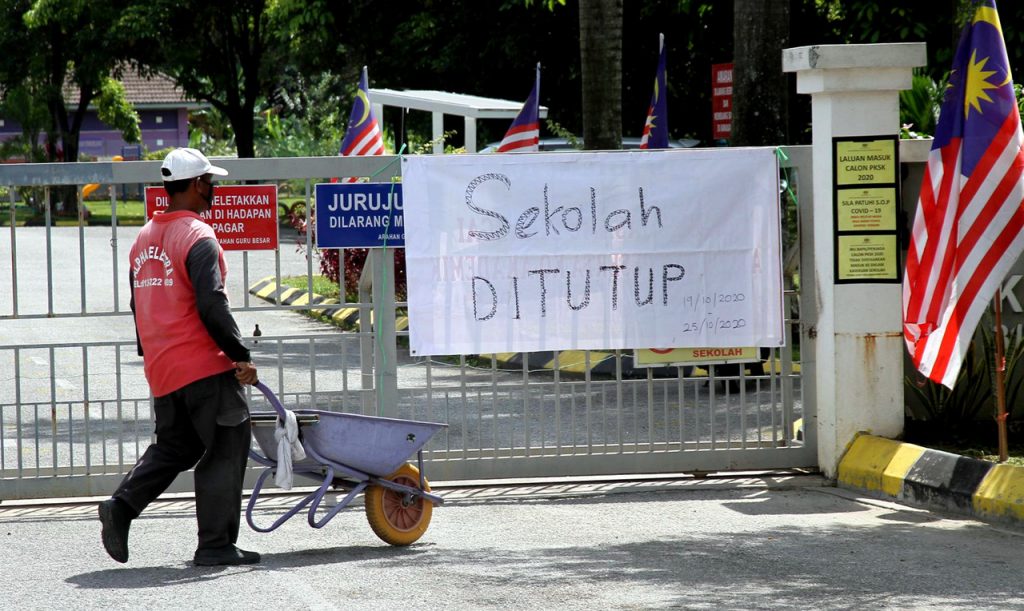
Published by Malaysia Now, Focus Malaysia, The Vibes & The Sun Daily image from Malaysia Now.
As 81% of children aged five to 17 are found to have experienced at least one symptom of trauma during the early phase of Covid-19, experts warn that the pandemic’s effect on their mental health will leave them with a deep scar that will stay for the rest of their lives.
In addition, statistics show that child helplines worldwide have seen a 30-40% increase in calls related to psychosocial mental health since March, with a large number of calls related to self-harm among children.
In short, while children are not affected by the economic downturn caused by the current health pandemic, the chaos, tension and instability of growing up during this crisis threaten to have effects on mental health for many children, particularly those who come from low-income and less educated households.
And while school closures and work-from-home have been the global response to the Covid-19 pandemic, this has reorganised family dynamics and created a stressful home environment.
Parents are not only squeezing in jobs or work-related tasks but also have to spend extra time home-schooling their children, taking care of them and dealing with their emotions.
These changes have placed parents at increased risk of parental burnout as they have many environments coming together at the spur of the moment.
This is backed by verbal evidence obtained from the Emir Research 3Q20 Focus Group Discussion, as some discussants highlighted how they are overwhelmed by the current situation (works and kids) and worried it could affect their mental health.
Experts say parents’ parenting actions may become stricter and more aggressive as they undergo elevated levels of cumulative stress.
This concurs with a study conducted by World Vision Malaysia which pointed out that 69% of children said their parents used physical punishment or psychological aggression due to the stress of lockdown measures and the loss of jobs.
While children already feel isolated because of school closures and extreme shifts in their regular schedules, harsh parenting will, in turn, have a detrimental effect on their mental health and will intensify their behavioural and emotional issues.
Apart from that, as children are required to adapt to online learning methods amid the pandemic, some seem to face an uphill task adapting to this sudden shift, especially those who come from the B40 economic group, some of whom may have limited access to the internet and electronic devices.
This hampers their ability to fully participate and engage in online learning and may lead to a growing sense of isolation and fear of being left behind by the others.
Studies show that this would negatively impact the development of their brain structure and damage the development of the nervous system’s support cells, which in turn affects the development of cognitive functioning (learning, thinking, reasoning, remembering, problem-solving and decision-making).
Looking at the magnitude of this issue, what can be done to address this problem before it silently “kills” our children?
First things first: as reported in Code Blue, since Malaysia only has 204 psychiatrists working at government facilities, the health ministry urgently needs to hire more psychiatrists and assign them evenly across the state as a means to improve access to mental health services.
This problem should be tackled as a matter of urgency, as a low number of psychiatrists would decrease the ability and efficiency of these services which would, in essence, increase the waiting time for suffering children to get the care they need.
The ministry also needs to introduce an early mental health screening service with free consultancy charges to make it easy and possible for everyone, especially the ones who come from B40 families, to get early identification so that early intervention can take place.
This is also vital to lessening the long-term disability of affected children and prevent years of suffering.
More investments should be made to educate members of the community and family members on mental health literacy through parenting workshops or peer assistance groups focusing on children as this will help create a supportive and enabling environment for the children.
Next, in order to support mental healthcare delivery, the government might also want to support and expand virtual mental health services. This service is not necessarily to be delivered through a website or application but could also be delivered through phone calls.
Although in-person treatment is best for the affected children, the pandemic and the potential for more waves make it imperative that we pursue options to address their needs.
In order to support the remote delivery of mental health services, mental health providers must ensure that they offer personalised care tailored to the needs of suffering children as virtual services may lead to a one-size-fits-all solution.
And most importantly, efforts must be taken to ensure patients’ safety and privacy in virtual care settings.
Nurafifah Suhaimi is Research Assistant at EMIR Research, an independent think tank focused on strategic policy recommendations based on rigorous research.

